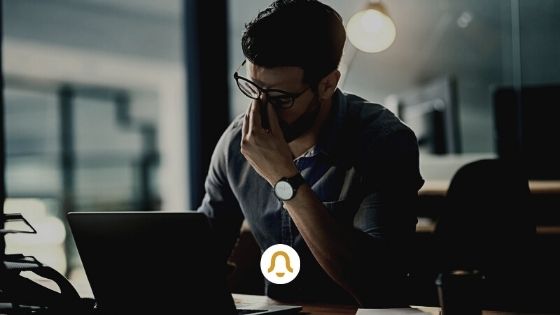You don’t have to work in a coal mine, an oil rig, a chemical plant, or a construction site to have a toxic and unhealthy job . At least that’s what Jeffrey Pfeffer, professor of organizational behavior at Stanford University (California, USA) and an expert in leadership and management thinks, and writes about it in his new book “Work is Killing Us”. All those who “live” in an office, where the pressure to perform can be just as unhealthy or even more unhealthy than manual work, will surely agree.
This is why coping with stress is so important
Workplace stress is not only considered common, it is even considered normal. But it affects the physical and mental health of the employee, his relationship with his family, his productivity and thus society as a whole – because this bears the costs of the resulting sick leave. And yes: you can die from work-related stress. In fact, every year more people die from this than from diseases as common as diabetes or flu, the book says, which provides many examples and studies.
Unfortunately, the outlook is not bright. Pfeffer does not trust companies to take action on their own initiative to address issues such as congestion and incompatibility. So the workers, regardless of whether they are self-employed or employed, have to “look after themselves”.
Coping with Stress: These tips can help you improve your work life
“While researching for this book, I often heard comments like these: ‘I am aware that my pace of work is unbearable, that I hardly spend time with my family and that all of this can take a toll physically and mentally in the end,” summarizes Pfeffer . But the subjects also agreed: “It will only be for a while”; “I have no choice”; “Nothing will happen to me because I am very young”; “I have good genetics”; and so on. “Almost everyone believes that they have something that magically makes them immune to an unhealthy work environment and that their health is not harmed in any way,” said the expert. His advice on how not to get sick is as follows:
-
Stop making excuses for not doing what you know you should be doing to take care of yourself at work.
-
Limit your work day and work at a pace that is manageable, assuming that everyone’s endurance is different and that resistance can be modified.
-
Go on vacation, take some time out, and spend time with your family and friends to find the social support that is so important to our wellbeing.
-
Don’t plan a caesarean section [or any other surgery] so you can deliver your child when the company suits you. Among other things, the high rate of surgical births is one of the many reasons healthcare costs have increased.
-
As we are influenced by others, look for people who don’t work all day and who have a relationship with their family and friends that goes beyond seeing them on wallpapers; People whose job gives them a degree of autonomy and control. Attachments with these people provide you with the social information and influence you need to make better decisions for yourself.
-
You have to be willing to admit that, as with any decision, you can make mistakes in choosing a career. So once you spot your mistake, do what you have to do to fix it.
-
When deciding on a potential job, company and other aspects of your working life, consider all the physical and psychological consequences of your decisions and actions. Just because many people suffer (and even die as a result of the work) doesn’t mean you have to.
-
When choosing a job and evaluating the company, remember that the company must put your health and wellbeing first in company results. There is more to work than just making money, and money cannot repair the damage that has been done to your relationships or your physical and mental health. Unless we take responsibility for only working where we can grow and move forward, we cannot expect companies to take care of our health.
Work-life balance: what really matters
And while you’re at it, don’t be dazzled by the siren chants of those companies that offer mundane amenities like “I’ve put a table football next to the cafeteria so the staff can relax” or that give you free food or allow you to Taking your dog to the office. Because that doesn’t mean that the work environment can’t be stressful.
Also Read:
- The 5-hour rule to be as successful as Elon Musk, Bill Gates & Co.
- The 15 most demanded jobs of 2021, according to LinkedIn
Many are willing to endure poor working conditions because they work for a reputable company or because their job is so interesting. But for Jeffrey Pfeffer, everyone, regardless of their profession or role, has a certain choice. “In almost every sector and industry, there are companies that are healthier than others. And some of the healthiest and most human companies are pretty prestigious and good for the résumé. And then there are companies like Amazon, where people like Dina Vaccari brag about it.” Having endured four days without sleep to get a project done on time.
“What really influences whether an employee is committed, productive and above all healthy is the working conditions and the work itself, so that these are not the source of the stress,” says Pfeffer.
Make sure that your boss is not underestimating or harassing you, that you have a room with good temperature, lighting and acoustic insulation, and that the company gives you autonomy and control over your work and encourages cohesion and support among workers, for the sake of their physical and mental health.


